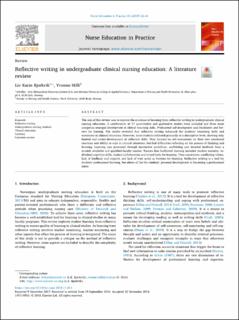Reflective writing in undergraduate clinical nursing education: A literature review
Peer reviewed, Journal article
Published version
Date
2018Metadata
Show full item recordCollections
Abstract
The aim of this review was to explore the evidence of learning from reflective writing in undergraduate clinical nursing education. A combination of 17 quantitative and qualitative studies were included and three main categories emerged Development of clinical reasoning skills, Professional self-development and Facilitators and bar- riers for learning. The results revealed that reflective writing enhanced the students' reasoning skills and awareness in clinical situations. However, most students reflected primarily at a descriptive level, showing only limited and varied development of reflective skills. They focused on self-assessment; on their own emotional reactions and ability to cope in clinical situations, but had difficulties reflecting on the process of thinking and learning. Learning was promoted through instructive guidelines, scaffolding and detailed feedback from a trusted, available and qualified faculty teacher. Factors that facilitated learning included student maturity, in- dividual cognitive skills, student collaboration and mixed tools for learning. Time constraints, conflicting values, lack of feedback and support, and lack of trust acted as barriers for learning. Reflective writing is a tool for students' professional learning, but above all for the students’ personal development in becoming a professional nurse.

